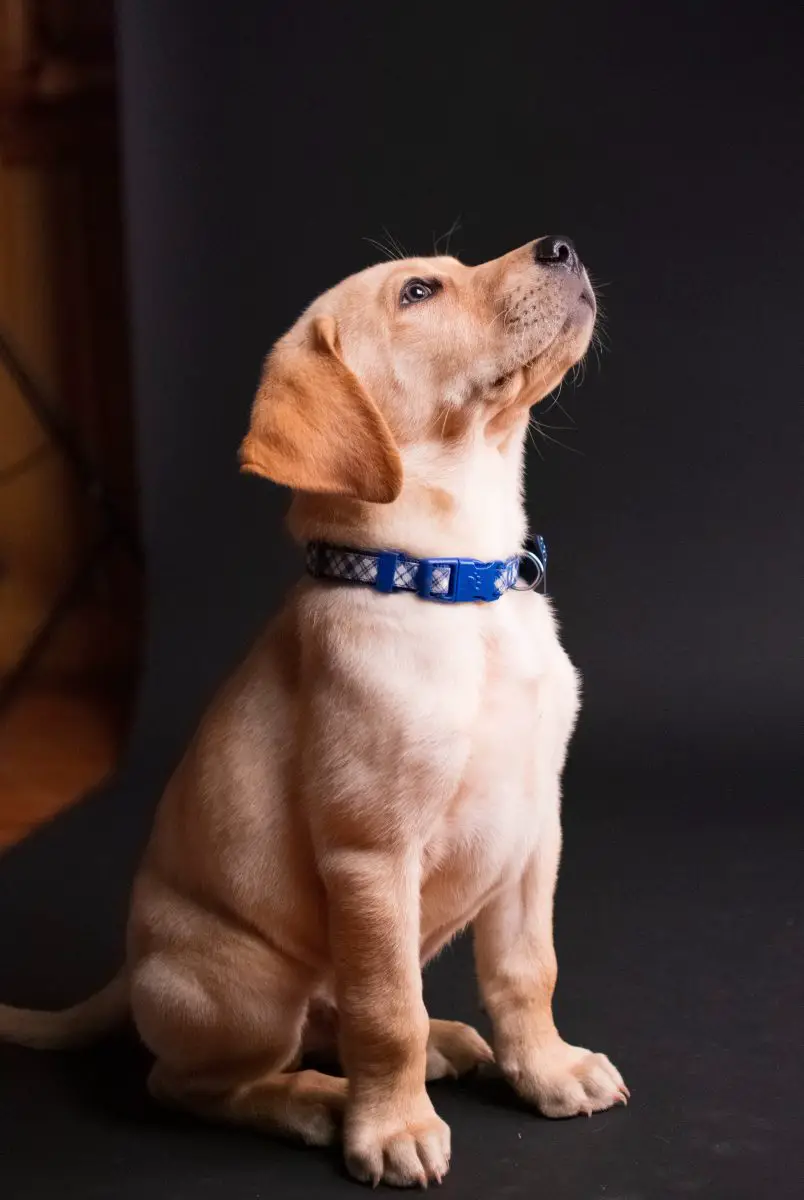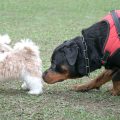Vous voulez croire que le nom créatif que vous avez choisi pour votre chien est celui qu'ils connaissent. Après tout, la plupart des chiens viendront quand vous appelez leur nom. Ils s'égayent également lorsque vous leur parlez; certains peuvent même pencher la tête. Il peut également sembler que, comme les humains, certains chiens sont plus expressifs ou bavards que d'autres. Alors, vous pourriez commencer à vous demander, est-ce que les chiens connaissent leurs noms ? Nous comprennent-ils vraiment ?
Bien qu'il n'y ait pas de réponse simple pour savoir si les chiens connaissent ou non leur nom, il existe des moyens de s'assurer qu'ils s'associent mieux à leur nom. Comprendre comment les chiens apprennent leur nom et s'en souvient vous aidera également à devenir un meilleur propriétaire.

Table des matières
- Comment les chiens comprennent leurs humains
- Choisir un nom de chien pour entendre un chien
- Apprendre à un chien son nom
- Comment réagir lorsque votre chien répond à son nom
- Combien de temps faut-il à un chien pour apprendre son nom ?
- Signes qu'un chien connaît son nom
- Qui est un bon garçon ?
- FAQ
Comment les chiens comprennent leurs humains
La plupart des animaux ne savent pas vraiment qui ils sont. Contrairement aux humains et aux corbeaux, la plupart des créatures n’ont aucun sens d’elles-mêmes. Cela ne veut pas dire que les chiens ne sont pas intelligents. La plupart des races peuvent reconnaître jusqu'à 165 mots en moyenne. Il y a même un Border Collie appelé Chaser qui connaît 1 000 noms d'objets différents.
Mais ils apprennent également différemment des humains. Alors, comment les chiens savent-ils de quoi nous parlons ?
Il s'avère que c'est un mélange de renforcement positif et de raisonnement déductif. On suppose que lorsque vous dites « Bonjour, mon pote », votre chien ne s'excite pas parce que vous le saluez. Au contraire, il remue la queue et sourit parce qu'il sait que des sons particuliers signifient qu'il sera bientôt nourri.
Il y a aussi la question du langage corporel. Si vous prenez la boîte de friandises pour chien, votre chien sait automatiquement ce que cela signifie.
Pourtant, en ce qui concerne votre chien se considérant comme un individu, comme dans «ma mon nom est Buddy » – cela n'arrive tout simplement pas. Oui, les chiens savent ce qui leur appartient, quand ils attirent l'attention sur un autre, quelle est l'odeur de leur pipi par rapport aux autres, etc., mais ils ne se connaissent pas eux-mêmes comme les gens.
Par conséquent, la plupart des dresseurs de chiens et des comportementalistes animaux supposent que les chiens perçoivent leur nom comme un ordre plutôt que comme une identification. C'est pourquoi, lorsque vous les appelez, ils accourent.
Choisir un nom de chien pour entendre un chien
La reconnaissance des mots peut être déroutante pour les chiens, car les gens ont tendance à leur lancer beaucoup de mots à la fois. Malheureusement pour nous, les humains, nous avons tendance à anthropomorphiser nos amis à quatre pattes. Encore une fois, les chiens sont intelligents, mais ils ne sont pas aussi intelligents que nous le souhaiterions.
Ainsi, lorsque vous choisissez un nom, ne rendez pas la tâche incroyablement difficile. C'est la même chose que lorsque vous commencez à enseigner les commandements et l'obéissance. Vous ne leur demandez pas poliment de s'asseoir. Vous dites simplement au chien de s'asseoir.
En d’autres termes, si vous choisissez un nom pour un chien, choisissez-en un qui remplisse tous les critères suivants :
- C'est un nom court
- Sons vocaux distincts
- Contient des consonnes dures
Selon cette définition d'un bon nom de chien, des options comme Max, Rover, Duke, Nike, Suzy et Tina sont toutes considérées comme idéales. Si vous choisissez un nom avec des sons doux, comme Echo, Anna ou Ollie, votre chien aura plus de mal à distinguer votre voix des autres bruits. De plus, vous devez éviter les noms longs. Même si Penelope ou Daenerys sont des noms amusants, le cerveau de votre chien va le brouiller.
Apprendre à un chien son nom
Comment les chiens apprennent-ils leur nom ? Grâce au renforcement positif. Vous prononcez leur nom et recherchez la réponse idéale, étant donné qu'ils viennent à vous. Ne vous inquiétez pas si votre nouveau chiot ou votre refuge ne répond pas immédiatement. Les noms sont déroutants pour les chiens au début, car c'est un mot qu'ils ne comprennent pas. Évitez également d’utiliser des renforcements négatifs ou des punitions sur les chiens. Ils auront seulement peur de vous et développeront de mauvais comportements.
La meilleure méthode pour apprendre à un chien son nom est d’abord de choisir un bon nom. Dites son nom et, s'il vous regarde ou s'approche, donnez-lui une friandise en guise de renforcement positif. Si votre chien n'est pas motivé par la nourriture, le jeu ou les animaux domestiques fonctionnent. Si le chien détourne le regard ou ne répond pas, répétez jusqu'à ce que vous obteniez le résultat souhaité.
Ne surchargez pas votre chien. 3 à 5 fois par jour suffisent pour commencer à reconnaître leur nom.
Ensuite, vous pouvez commencer à associer leur nom à une commande, telle que « Fido, assieds-toi » ou « Fido, allonge-toi ». Parce qu’ils considèrent leur nom comme un ordre de prêter attention ou de venir, l’ordre secondaire est plus facile à suivre.

Comment réagir lorsque votre chien répond à son nom
Vous voulez accélérer le processus d'apprentissage ? Comme mentionné, le renforcement positif, comme une friandise, est la clé. Les chiens comprennent les louanges comme les gens, alors félicitez-les souvent. Vous voulez montrer à votre chien à quel point vous êtes excité lorsqu'il fait la bonne chose. Dire « oui ! » heureusement quand ils vous regardent lorsque vous prononcez leur nom, c'est un début. Au fur et à mesure que votre chien comprend mieux son nom, ajoutez d'autres mots, comme "Hé, tu veux aller te promener, Cliff?" et voyez s'ils vous regardent lorsque vous prononcez leur nom. S’ils le font, donnez-leur une friandise.
Voici quelques conseils supplémentaires pour apprendre son nom à votre chien :
- Offrez de l'affection ou des friandises à votre chien chaque fois qu'il fait quelque chose de bien.
- Dites toujours le nom de votre chien de la même manière. Évitez les chants et autres changements mélodiques.
- N'utilisez jamais le nom de votre chien lorsque vous le punissez. Vous voulez que votre chien associe son nom uniquement au bonheur.
- Ne prononcez pas le nom de votre chien lorsque vous ne voulez pas de réponse. Si vous souhaitez discuter de votre chien pendant qu'il est dans la pièce mais que vous ne voulez pas qu'il réponde, essayez d'utiliser un surnom. Sinon, vous pourriez semer la confusion.
Combien de temps faut-il à un chien pour apprendre son nom ?
Pour récapituler : les chiens connaissent-ils leur nom ? Pas vraiment. Ils n'apprennent pas qu'ils s'appellent Fido ou Frank. Mais ils comprendront que leur nom requiert leur attention. Si vous dites régulièrement son nom à votre chien pendant une période de deux semaines, il devrait le connaître dans un délai de deux semaines et demie. La cohérence est cependant cruciale.
Répétez le processus de formation tous les jours et soutenez toujours leur bon travail avec un renforcement positif.
De plus, l'âge du chien et sa race auront un impact sur la rapidité avec laquelle il apprend son nom. Les chiots reprennent leur nom plus rapidement que les chiens plus âgés. Les races de travail et de berger ont également tendance à apprendre les commandes plus rapidement que les autres races.
Signes qu'un chien connaît son nom
Alors vous êtes peut-être curieux. Comment savoir quand un chien connaît son nom ? Quels sont les signes ? Les chiens répondront au ton de votre voix et à leur nom, même à distance, quand ils le sauront. Par exemple, si vous appelez leur nom au parc à chiens, ils devraient accourir.
Vous pouvez commencer à tester dans quelle mesure ils connaissent leur nom en créant une distance. Au début de la formation aux noms, vous commencez en face à face. Mettez bientôt des meubles, des murs, des pièces et un plus grand espace entre vous. Recherchez également le contact visuel, la queue qui remue, les oreilles dressées, la tête penchée et d'autres signes d'excitation. Certains chiens aboient même lorsque vous prononcez leur nom, car ils savent qu'ils seront récompensés d'une manière ou d'une autre.
Qui est un bon garçon ?
Les chiens connaissent-ils leurs noms ? Dépend. Les chiens ne savent peut-être pas que le nom fait référence à eux, mais ils savent que le mot est associé à de bonnes choses. Si vous dressez bien votre chien et que vous le félicitez beaucoup, il finira par aimer son nom et ce qu'il signifie. Utilisez leur nom pour créer un lien plus fort et ils viendront en courant chaque fois que vous appellerez.
FAQ
Même si nous ne parvenons pas à comprendre pleinement les processus de pensée complexes des chiens, il est clair qu’ils associent leur nom à de l’attention, des activités et des expériences positives. Utiliser efficacement leur nom peut améliorer la communication et renforcer le lien entre vous et votre compagnon à quatre pattes.




